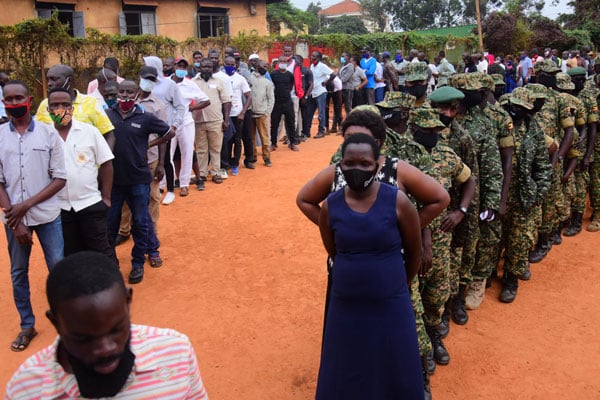8 million voters stay home on polling day

Soldiers and civilians line up to vote on January 14, 2021 during the general election at Mubarack, A-M Polling Station in Kampala. PHOTO/MICHAEL KAKUMIRIZI
What you need to know:
Insecurity
- ‘‘The war drums that had been sounded prior to the election, the events of November 18 and 19 [2020] scared away many people. People thought the election day was going to be bloodshed, so they stayed away from the polling stations,” Mr Crispin Kaheru of Independent Election Observers
Nearly half of all registered voters did not show up to vote in the January 14 presidential election.
Of the 18 registered million voters, eight million did not appear at the polling stations to cast their vote.
This is about 2.5 million more than the 5.8 million voters who voted President Yoweri Museveni, who was declared winner of the election.
According to the figures by the Electoral Commission (EC), the long queues of voters at polling stations observed in different areas are not reflected in the number of votes cast.
While announcing the election results on January 16, the EC chairperson, Justice Simon Byabakama, said 10,359,479 votes were cast for the presidential elections, representing 57.22 per cent of the registered voters.
EC records show that 18,103,603 Ugandans were registered voters this year.
Voter apathy in Uganda’s elections
In 1996, when general election was first held under President Museveni’s reign, 72 per cent of then 8.5 million registered voters turned up to vote. The percentage of voter turnout has been steadily declining, dropping to 69.7 per cent of 10.8 million voters in 2001 and further to 69.2 per cent of 10.5 million voters in 2006.
In the 2011 General Election, voter apathy hit a record of 57.1 per cent, where 5.6 million voters did not turn up to vote, which was higher than the 5.4 million who had voted Mr Museveni.
However, in the 2016 General Election, the voter turnout grew to 67.61 per cent.
The low numbers in last week’s election has been attributed to anxiety over security.
According to a report titled ‘Citizen Views on the election environment for the 2021 General Election in Uganda’ released on January 12 by Afrobarometer research firm, 62 per cent of the 2,400 respondents believed the enforcement of the standard operating procedures would affect the election. About 72 per cent of the respondents also believed infections would soar due to people gathering to vote.
Mr Crispin Kaheru of Independent Election Observers, told Daily Monitor in an interview that there was public anxiety which deterred many from voting.
“The war drums that had been sounded prior to the election, the events of November 18 and 19 [2020] scared away many people. People thought the election day was going to be bloodshed, so they stayed away from the polling stations,” Mr Kaheru said.
More than 50 people were killed in November last year, when protests broke out in Kampala and across different towns in the country after the arrest of presidential candidate Robert Kyagulanyi, alias Bobi Wine.
NRM says
The National Resistance Movement spokesperson, Mr Rogers Mulindwa, had earlier projected that the Internet shutdown would increase voter turnout. He argued that many social media users who would post false information to scare away voters had been curtailed.
However, despite assurance of safety and protection by President Museveni, Kampala remained ‘deserted’ on the election day and at the weekend as security forces on foot and in armored vehicles patrolled the streets.
Mr Kaheru said the players in the election also did not engage the population to rally them to vote.
“We missed out on voter mobilisation. In 2016, we had Topowa campaigns. That was not done. We did not mobilise Ugandans to come out and vote. That is why you have leaders elected by only 10 million out of 18 million voters. That is quite worrying,” he said.
Opposition’s view
Mr Ibrahim Ssemujju Nganda, the Forum for Democratic Change party spokesperson, said some voters had moved to other areas and could not afford transport back to their polling stations.
He also said many Ugandans have lost faith in elections as a means of delivering positive impact.
Also on January 15, Daily Monitor reported a late start to voting and a slow voting process due to the problematic biometric voter machines.




